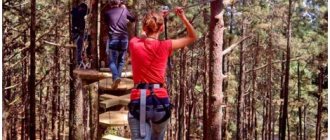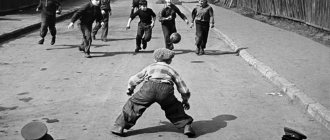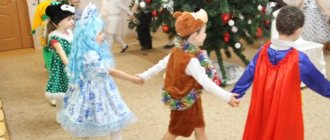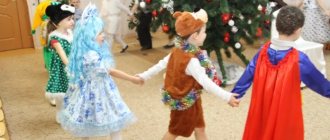LiveInternetLiveInternet
It's summer now, it's warm and we often go for walks and play outdoor games.
Since you don’t really run around in an apartment, every child needs to develop physically, especially if you do it in a fun company.
So read, study and play with your children!
Fun outdoor games for children in summer, autumn and spring.
1. In search of treasure.
Take some kind of toy, sweets, etc. as a “treasure”. It's best to wrap it in foil. Show the sealed “treasure” to the children and ask them to close their eyes. Hide the “treasure” in a tree, behind a stump, swing, bench or somewhere else. Let the children go on a search. Whoever finds the “treasure” first wins.
2. Find a match.
The leader distributes multi-colored circles or flags to all children (a pair of each item). At the leader’s signal, the children run, and when they hear a clap or the sound of a whistle, everyone must find a pair based on the color of the circle or flag and hold hands. An odd number of children can also take part in the game, then one will be left without a pair and will leave the game.
3. Reviving objects.
This game is especially suitable for little ones. At home, cut out funny eyes from paper and take a piece of plasticine and go for a walk with the children. Let the children choose which objects they want to revive - flowers, trees, carousels... You can even arrange a competition between the children to see who can “revive” the objects the fastest. This develops children's imagination well.
4. Ring.
Children sit on a bench or stand in a row. The leader takes a ring or some other small object and pretends to place this ring in the palms of each of the players. Then he says: “Ring, go out onto the porch!” and the one who really has the ring left in his palms tries to quickly jump out, and the other children try to prevent him from doing this. If the player manages to jump out, then he takes the place of the leader.
5. Find a plant.
The children turn away, and the leader picks a leaf or any plant. The children’s task is to find the same one as quickly as possible. Whoever is first becomes the leader.
6. In the sandbox.
We take some object, ask the children to turn away, and bury this little thing in the sandbox. Children must dig with shovels and find the buried object. (It’s very good to play this game on the beach. You just need to outline the area for searching).
7. Balloon tennis.
Take badminton or tennis rackets. Inflate a balloon and use it instead of a tennis ball or shuttlecock. The balloon flies for a long time, and the child has time to think a little about where to run and hit the ball.
8. Winding the rope.
Only two people can play this game. If there are more people willing, then you can play alternately with the winner, and the rest are fans. Take two identical branches or sticks and a longer rope (3 meters or more). We tie a branch or stick to each end of the rope. In the middle of this rope we tie a flag or make a knot. Each participant takes a stick and moves away so that the rope itself is well stretched. So, at a signal, the children begin to wind the rope around their stick. Whoever reaches the knot or flag the fastest is the winner!
9. Crow.
One child is blindfolded and stands with his back to the children. Each player must approach the leader and place his hand on his shoulder. The driver says: “Caw, crow!” The player croaks, and the driver guesses the name of the one who croaked. If he guesses correctly, he changes places with the player.
10. Rain and sunshine.
We draw a circle on the asphalt and ask the children to stand in it. When the presenter says “Sunshine,” the children leave the circle, run, and jump. And when they hear the word “Rain,” the children should form a circle as quickly as possible. Whoever is last loses.
11. Snake.
Children join hands, and then a whole “chain” is built. The presenter takes the last one by the hand and leads this “snake”, making various unexpected turns. The kids must hold on tightly so as not to break the “chain.” If the children are quite old, then you can run like a snake.
12. Deaf telephone.
Children line up. The first in the row whispers a word into the ear of his neighbor - he repeats this word to the other in a whisper, and so on. The latter names the word he heard. Usually the named word only causes laughter...
13. Repeater.
Children stand in a circle, the first player shows some movement (for example, clapping), the next one repeats everything and adds another movement. So everyone must repeat all the movements shown in front of him and add his own. Whoever messes up is out of the game.
14. Edible-inedible.
For this game, take a ball. Have the children stand in a row or sit on a bench. The driver begins to throw the ball to each player, naming an edible or inedible object. If the named item can be eaten, the children catch the ball, if not, they throw it back to the driver.
15. Drive more quietly.
Children stand on one side of the “road”, and the leader stands on the other, turning his back to everyone. The presenter says: “The slower you go, the further you will go.” - the children begin to run, trying to reach the finish line as early as possible. After a few seconds, the presenter says: “Stop!” – the children stop running and freeze. The presenter turns around, and if he sees any movement of any player, he is eliminated from the game. The winner is the one who runs to the finish line first.
16. Hot potatoes.
Children stand in a circle. The driver gives a signal or turns on music (you can use music from your phone). Children begin to throw the ball to each other, trying to get rid of it as quickly as possible. When the driver gives a signal or turns off the music, the one who still has the ball in his hands is eliminated from the game. When 1 player remains, the game ends and he becomes the winner.
17. Fishermen and fish.
Two children are chosen as fishermen, and the rest are fish. The children begin to dance around the fishermen and sing a song: Fish live in the water, There is no beak, but they peck. If they have wings, they don't fly, but they don't have legs, but they walk. They don’t make nests, but they take out the babies. The “fishermen” join hands and quickly catch all the scattering “fish”. The “fish” that come across already become “fishermen”. Now these “fishermen” join hands and begin to catch other children. So the “Network” becomes even larger.
18. Semyon speaks.
The presenter must say the words: “Semyon says” and then say what all the children should do. If the words: “Semyon says” do not sound, then the command should not be executed. And the children answer: “Semyon didn’t say.” For example, the presenter says: “Semyon says - run!” Children are running. Whoever begins to carry out any command from the leader, without saying “Semyon says,” misses a turn or leaves the game.
19. At the bear's in the forest.
One child squats in the designated area and pretends to be a sleeping bear. Children walk around him all the time and pretend to pick mushrooms and berries, singing a song together:
“I pick berries and mushrooms from the bear in the forest, But the bear is no longer sleeping, He is looking at us! The basket overturned - the bear attacked us.” The “bear” quickly jumps up and begins to catch the children who are running away from him. Whoever the “bear” catches takes his place.
20. Owl
The driver stands out - “owl”. The players are on the playground, and the “owl” is in the nest (a designated place for this). At the signal “The day is coming,” children, imitating the flight of butterflies, dragonflies, birds, beetles and “turning” into other animals, frolic, trying to most accurately show who they are portraying. At the command “Night is coming,” all players must “freeze” in the position in which it caught them. The “owl” goes out “to hunt” and takes those who move to the nest.
At the signal “The day is coming,” the “owl” goes into the nest, and the players “come to life” again. “Owl” changes after 2-3 games.
21. Wolf in the ditch
Two parallel lines about a meter wide are drawn in the middle of the site. The “ditch” can be lined with skipping ropes. One or two “wolves” are selected. They stand in the ditch. All other players - “goats” - are placed on one side of the court, in the “pasture”.
At a signal, the “goats” run to the other side, jumping over the ditch. "Wolves" Without leaving the ditch, they try to kill as many “goats” as possible.
The donated “goats” are counted and the game continues. “Wolves” change after 2-3 runs.
22. Seine
Two of the players are “fishermen”, the rest are “fish”. “Fishermen”, holding hands, catch “fish”, surrounding them with their free hands. The caught “fish” join the “fishermen” - the “net” increases. Fishing continues until there are 2-3 uncaught “fish” left.
23. "Hare without a home"
The players, except for the two drivers, become pairs facing each other, hold hands and position themselves around the court. Between the pairs there is a third one - a “bunny”.
One of the drivers is the “hare”, the other is the “hunter”. The "hare", escaping from persecution, stands in the middle of the pair, displacing the "bunny" located there.
If the one chasing has stained the one escaping, they change roles.
24. “Guess whose voice”
All players form a circle, and one of them stands in the center and closes his eyes. Children, holding hands, walk in a circle to the right (left) and say: So we lined up in a circle, Turned suddenly at once . At these last words, everyone releases their hands and turns 360 degrees, continuing to move in the same direction. How about we say: Skok, skok, skok, Guess whose voice it is.
The words “skok, skok, skok” are spoken by one who was chosen in advance. Or an adult shows who will speak
The person standing in the center opens his eyes and tries to guess who said the words “jump, juice, jump.” If the driver guessed right, he goes to the middle. If the driver does not guess correctly, he continues to drive - stand in the middle of the circle.
We play these interesting outdoor games for children on the street in spring, summer, and autumn. What children's games do you play with your children on a walk? Share in the comments!
tcc www
Role-playing games for children 7-10 years old
With the help of role-playing games, children become more sociable and sociable. They learn to reproduce real life events and implement their ideas. Expand your horizons with knowledge of the world around you.
- Game Store
Participants in the game need to construct a store using improvised means.
- Divide the roles of loader, seller, cashier and customers among themselves. The cashier needs to make banknotes out of paper.
- The seller will make a display case and display the goods. The loader is responsible for the assortment of products and their replenishment. In addition to the products presented, buyers can make special orders.
Shop
With the help of this game, children try on the functions and responsibilities of adults. They learn to interact with each other.
- Circus game
The participants of the game organize a joint performance. Everyone must come up with a circus act and choose the necessary attributes and accessories. Children must make tickets for the performance and organize a place for the stage. You can appoint one presenter who will distribute the numbers between the participants. With the help of this game, children develop their imagination and artistic skills.
- Game Construction
In this game, children need to build a house. Players must figure out how to make a structure and prepare the necessary materials. At home, you can use furniture elements, bed linen, and basins for these purposes.
Construction children
Large boxes, oilcloth, tree branches and other devices are ideal for outdoor use. You can make several houses and visit each other. During the construction process, children learn to find a way out of various situations and develop creativity.
- Game School
Children jointly organize the learning process. Stationery and books are prepared. They distribute teaching subjects among themselves, including physical education, music, and works. Each lesson is given a short time. Organize a fun time during recess. Such a game will unite children into a common team and allow them to analyze their school behavior.










